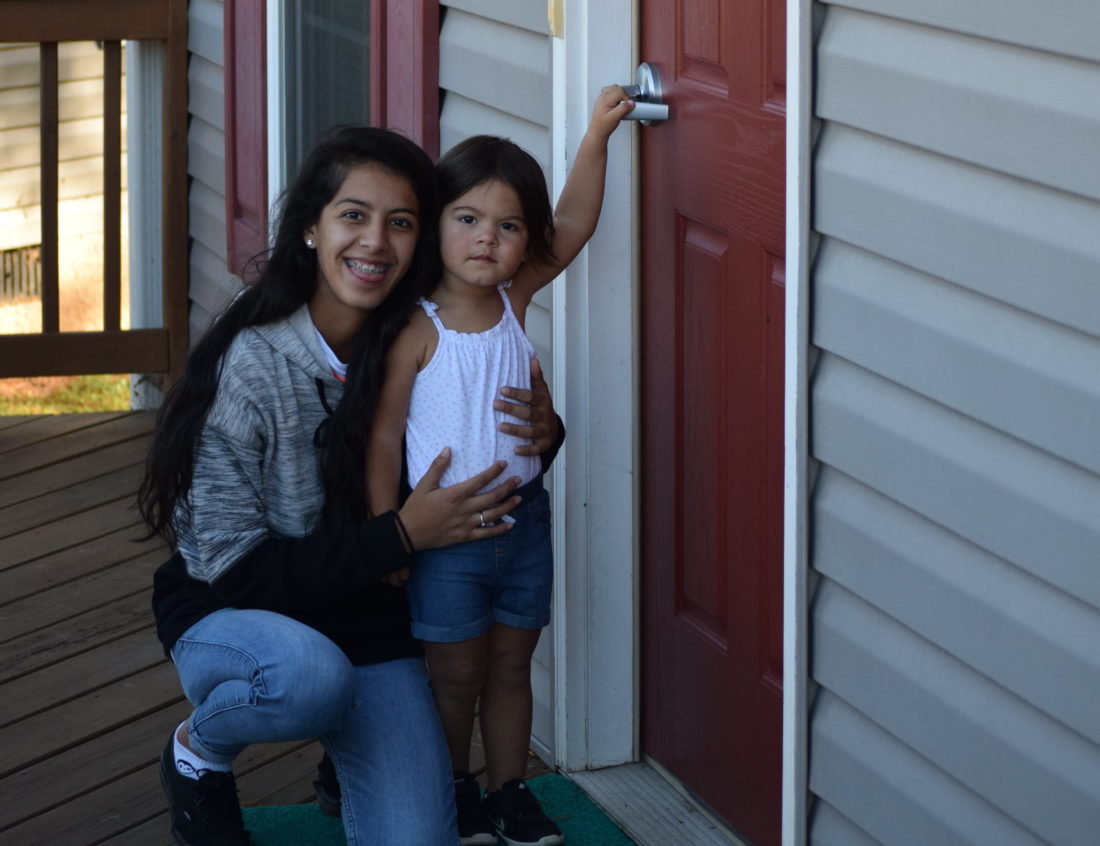The U.S. government is fighting the COVID-19 pandemic with a pair of injections — vaccinations for arms and heaps of cash for the economy. The latter response may have a beneficial side effect for Western North Carolina: offering people who are chronically homelessness or housing insecure a new beginning.
Nearly $50 billion in federal support has been designated for emergency coronavirus protection measures specifically for people experiencing homelessness. According to Emily Ball, who works as the homeless services lead for the city of Asheville, the funds also offer an unprecedented opportunity to place many of Asheville’s homeless residents into permanent housing.
“[The funding is] intended to be a pandemic response; it’s not actually intended to end homelessness. It just is, happily, an opportunity for us to end homelessness, because that is also a response to the coronavirus,” says Ball. “We can actually significantly reduce the number of people who are homeless right now as the direct result of that money.”
Care package
The Coronavirus Aid, Relief and Economic Security Act, also known as the CARES Act, was signed into law by former President Donald Trump March 27, 2020, and provided $2.2 trillion in pandemic relief to individuals, families, business owners and local governments.
The law also set aside funds to specifically protect homeless Americans, who Ball says are at greater risk for contracting COVID-19. People who are homeless tend to gather in congregate settings, such as homeless shelters or meal-sharing locations, and may also lack access to running water or bathroom facilities to wash their hands, which puts them at greater risk of exposure to the disease.
The federal Centers for Disease Control and Prevention also considers unhoused people particularly vulnerable to severe complications from COVID-19 due to their prevalence of underlying medical conditions. One study from the Coalition for the Homeless found the age-adjusted COVID-19 mortality rate for people experiencing homelessness in New York City to be as much as 75% higher than that for the city’s general population.
“Homelessness is a public health issue to begin with, and this is a public health crisis,” Ball says. “It’s really just a perfect storm that’s creating a need to prioritize those folks.”
By the numbers
Ball says Asheville received $3.5 million in CARES Act funds designated for homelessness resources, primarily as coronavirus-specific Community Development Block Grants and Emergency Solutions Grants.While Asheville has received between $1 million and $2 million in CDBG funds per year, the CARES Act added an extra $1.1 million to that pool. Because the grants were aimed at pandemic relief, the city opted to support rapid rehousing for people who are currently homeless, as well as rental assistance for people facing eviction due to job loss or other reasons.
The city contracted with Homeward Bound of WNC and Pisgah Legal Services to administer the grants and provide rental assistance to eligible households for up to six months. As of March 16, Pisgah Legal has reported serving 88 households in danger of becoming homeless, while Homeward Bound has moved 13 people into permanent housing, according to a staff report.
The CARES Act will also allow the city to access funds from the Federal Emergency Management Agency to reimburse expenses for renting 60 rooms at the Red Roof Inn at 16 Crowell Road. The city has fronted roughly $567,000 for the shelter so far; 136 unhoused people have stayed at the motel since May 11, with an average stay length of 138 days. According to a March 16 staff report, 33 shelter residents have exited to permanent housing, with six of them supported by CARES Act money. The city’s current contract will fund the temporary shelter until Wednesday, June 30.
The largest boost for homeless service providers has come through coronavirus-specific ESG funds, which are funneled through the city to multiple organizations within Buncombe County. The grants, which totalled about $128,000 annually before the pandemic, fund street outreach, emergency shelter, homelessness prevention and rapid rehousing. The coronavirus-specific funding authorized through the CARES act was $2.3 million.
Homeward Bound received nearly $860,000 in ESG funds, which will be used for rapid rehousing efforts. Nicole Brown, the organization’s deputy director of programs and strategy, says that the money will likely help 45-55 people who have been chronically homeless in Asheville.
“These funds have given us the ability to work with some of the highest-need, chronically homeless folks in our community and provide them with two years of financial support and case management assistance,” says Brown. “We wouldn’t be able to house these folks without this funding.”
On target

Some ESG grants are being distributed to organizations that target specific subpopulations of people at risk of becoming homeless, such as young adults or victims of domestic violence.
Eliada, an Asheville nonprofit serving children and families, is set to receive roughly $100,000 in ESG funding, its inaugural grant from that source. Sarah Dickerson, who directs the Eliada Students Training for Advancement at Eliada, says the organization will use the money to provide rental assistance to young adults ages 18-25 who make less than 80% of the area median income, or roughly $40,000 a year for a single individual. The move is designed to prevent homelessness in at-risk young adults.
“We’ve been doing this for a while and we found that, when we’re looking at our annual outcomes data, housing has been everyone’s biggest barrier to being successfully independent,” she explains. “We want to be able to help these students be able to find safe and secure housing.”
In some cases, the funds will be used to pay the security deposit or first month’s rent on an apartment. The longest available grant pays for six months of rent, and case management will be offered for up to a year. Dickerson says that Eliada expects to serve 33 people through rental assistance for the year.
“When we are able to intervene now at this age, these students are still open to learning. They still have great opportunities. … They aren’t in survival mode,” Dickerson says. “A lot of our students have had trauma but not the compounded trauma like what you see with the chronically homeless. So when we’re able to help these students get housed now, we are truly helping them to not develop more trauma that is affecting their ability to be safe and secure in housing.”
April Burgess-Johnson, executive director at Asheville-based nonprofit Helpmate, says that the domestic violence prevention organization also received coronavirus ESG funds through the city. In a normal year, the nonprofit receives roughly $45,000 from that source; through the CARES Act, those funds rose to $429,000.
Helpmate plans to use approximately $240,000 to place victims of domestic violence into permanent homes; another $160,000 will go into homelessness prevention through temporary rent assistance. The extra funding will allow Helpmate to add 40 individuals to the usual 10-12 people that it houses each year.
“It will be lifesaving for people,” Burgess-Johnson says of the extra funding, noting that the COVID-19 pandemic has been particularly hard on domestic violence survivors. “During the period where we had stay-at-home orders, there were victims that were literally trapped inside a household without the escape of work for themselves or school for their children. We’re starting to see what other countries have seen as they’ve started the gradual process of reopening: As there’s more freedom, that gives the victims some flexibility so they can come out and get some help.”
Seizing the moment
Most funding from the CARES Act is set to expire in September 2022, but ESG funding must be spent by June 30 of that year. While Brown is concerned about the potential impact of those funds not being available in the future, she hopes to spend the next two years raising money for additional case managers, finding permanent housing for potentially hundreds of homeless or housing-insecure people and building new partnerships for long-term support.
She also points to the American Rescue Plan, a law signed by President Joe Biden March 11, which promises $5 billion in new funding specifically to reduce homelessness, more than $21.5 billion to replenish emergency rental assistance funds and $5 billion in emergency housing vouchers. Brown says that she is also hoping to see the expansion of homelessness programs at the federal level beyond the pandemic.
“It’s really unprecedented that we have had this much money to focus on homeless services in our country,” says Brown. “It’s really exciting, but we can’t stop there. Support is still needed after this pandemic is over.”
For Ball, there’s no time like the present.
“There is so much opportunity right now. This is a convergence of a long-standing public health crisis of homelessness in our community, and a global public health crisis and new resources,” Ball says. “It’s time to seize this moment.”




I am astonished how one-sided this is. That is NOT what homeless are experiencing.